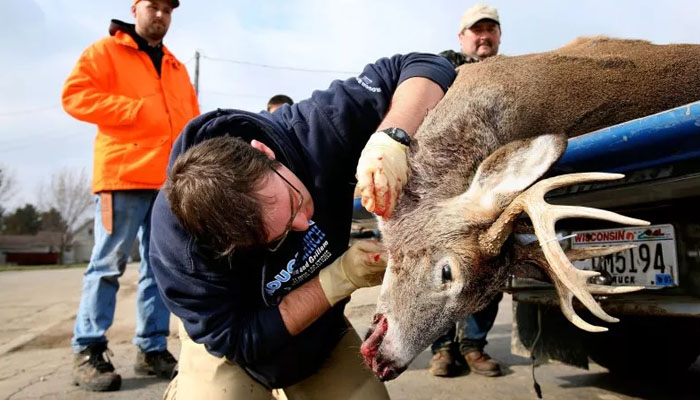Zombie Deer Disease: What to know after Idaho reports first CWD infection in mule deer?
A mule deer hunted down in Game Management Unit 32A near McCall in Yellowstone National Park tested positive for Chronic Wasting Disease
Alerts have been issued after the report of the first case of 'Zombie Deer Disease' or Chronic Wasting Disease (CWD) — a deadly and extremely contagious illness that was first identified in deer in Idaho's Yellowstone National Park in 2021—, which has expanded to new state regions.
A hunter's kill in Game Management Unit 32A near McCall resulted in a mule deer that tested positive for chronic wasting illness, a neurological disorder that affects deer species, reported MDJ.
In the last two years, Fish & Game has carried out extensive testing to ascertain the prevalence and extent of chronic wasting illness, as the condition was previously only seen in animals in Unit 14 near Riggins.
The sickness belongs to the same family of prion diseases as Creutzfeldt-Jakob disease and mad cow disease.
Chronic wasting disease, sometimes known as "zombie deer disease," is brought on by abnormal protein accumulation in the brain, which can result in malnourishment, neurological problems, and strange behaviour.
Officials from Fish and Game are requesting that hunters harvesting elk or deer in Units 32A, 22–24, and 32 test their animals for chronic wasting illness. The animal can either be tested by submitting its lymph nodes or by taking its head to a regional Fish and Game office. There are instructions on the Fish and Game website on how to remove lymph nodes.
Any animal that tests positive for chronic wasting illness should not be eaten, according to the Centres for Illness Control and Prevention. The Department of Fish and Game advises hunters to use caution while handling harvested animals, including wearing gloves, avoiding touching sick-looking animals, and getting animals tested for chronic wasting disease if they are taken in an area where the disease has been detected.
Roadkill deer or elk found along the US 95 route between Riggins and Weiser should be reported to Fish and Game's Nampa regional office or the McCall regional office. Additionally, people must report any odd behaviour displayed by local elk or deer.
Fish and Game won't know the results of tests on other animals for many more weeks, but the agency reported that this is the first case of chronic wasting syndrome to be officially confirmed during the autumn hunting season.
The agency will approach the management of chronic wasting disease in the Unit 32A region differently, according to a news release issued by Fish and Game Director Jim Fredericks on Wednesday. This is because deer in the unit often leave in the late autumn.
-
Epstein estate to pay $35M to victims in major class action settlement
-
What we know about Chris Cornell's final hours
-
5 famous celebrities who beat cancer
-
Oprah Winfrey talks about weight-loss 'tool to manage' health
-
South Korea’s ex-President Yoon issues public apology after being sentenced to life over martial law
-
Trump officially directs US agencies to identify and release files on extraterrestrial life
-
Who is 'Queen of Woke'? UK first female Civil head
-
Dwayne Johnson confesses what secretly scares him more than fame












